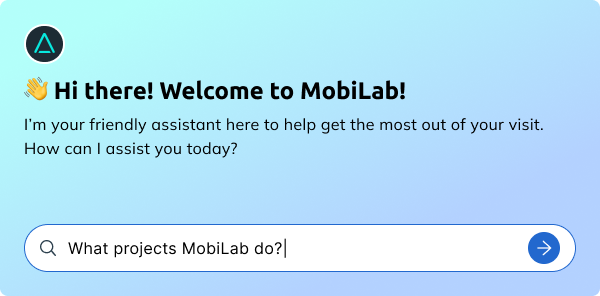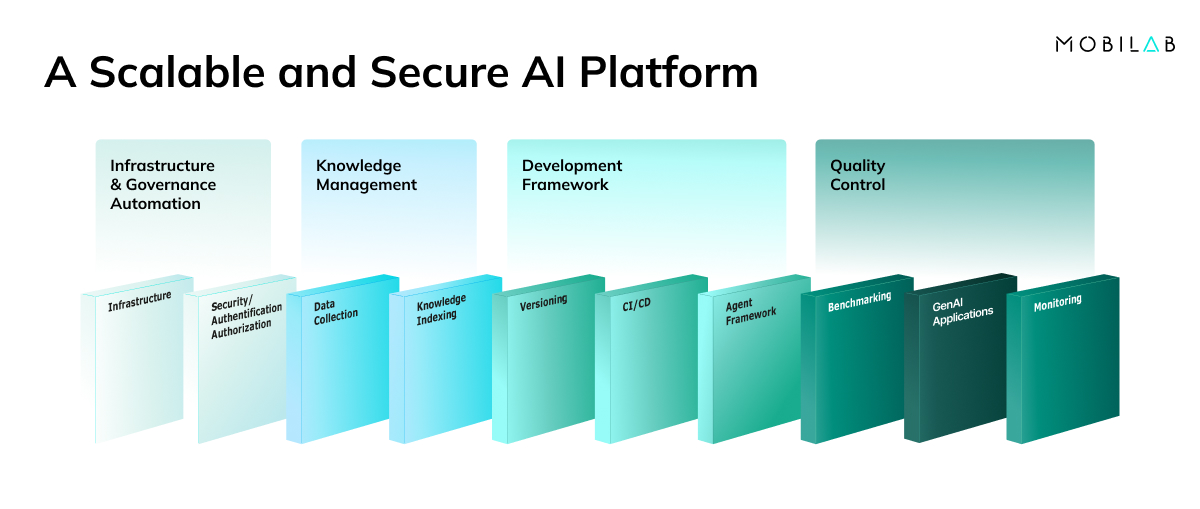Artificial Intelligence (AI) chatbots have rapidly evolved from simple conversational agents to indispensable tools for business operations. The potential is boundless, whether it’s automating customer support, generating actionable insights, or enabling natural-language-powered data exploration.
However, scaling AI successfully requires more than just deploying a chatbot. Without a structured approach, organizations risk fragmented systems, inconsistent data and AI governance, and infrastructure bottlenecks.
At MobiLab, we are focused on developing solutions for our customers with a structured approach that helps enterprises reach their goals efficiently and sustainably by developing use cases while simultaneously creating a scalable and robust foundation, which involves developing a robust Cloud infrastructure, streamlining knowledge management, as well as other tech frameworks.
By addressing these elements during AI maturity — not after — it becomes possible to scale AI solutions seamlessly without constant rework. Our structured approach ensures chatbots are not just standalone tools, but integrated, enterprise-grade solutions that evolve with the business.
AI Chatbots for Corporate Applications
Imagine asking a chatbot: “Generate a PowerBI report on quarterly sales growth by region,” and receiving the insights you need within seconds. This is the power of conversational AI when it’s seamlessly integrated into enterprise systems.
AI chatbots are raising the bar on productivity and data-driven strategies. They allow users at every level access to data, knowledge, and analysis, interacting with complex systems and improving productivity and decision-making accuracy.

Building GenAI Applications with Lasting Impact
Building GenAI applications such as AI chatbots involves expertise at multiple levels, including navigating infrastructure and governance, knowledge management, AI frameworks, and monitoring. At MobiLab, we have established a structured approach that harmonizes value creation with the continuous evolution of an enterprise-grade AI platform.
We believe the best way to start is by identifying a high-impact use case and maintaining the speed and momentum of innovation.
- We often start with a Proof of Concept (POC), a hands-on session where we test the feasibility of a GenAI application in a real-world scenario. This allows us to assess potential roadblocks quickly, fine-tune the approach, and create a working prototype aligned with business needs. It also enables our customers to evaluate the business case quickly.
- From there, we develop an AI App MVP (minimum viable product), focusing on delivering tangible value while keeping scalability in mind. In parallel, we define an AI vision and roadmap, describing how both the application such as a chatbot and the underlying foundation will evolve into a strategic asset rather than a standalone tool.
Once a mature AI foundation is in place, organizations can roll out AI solutions across departments with minimal friction. With strong governance frameworks in place, we monitor costs, performance, and usage, optimizing the system as it scales.
Our expertise extends beyond chatbot development. We make sure any newly developed AI product integrates seamlessly with enterprise infrastructure, knowledge management systems, and data platforms. This holistic approach ensures that companies are not just adopting AI but embedding it into their workflows in a way that drives measurable impact, ensuring long-term success.
Building AI Maturity to Power Full-Scale Adoption
Starting with a single chatbot use case is a great entry point, but without a structured path to AI maturity, organizations risk running into infrastructure roadblocks, redundant data work, and compatibility issues that slow down progress. Every new AI initiative shouldn’t mean rebuilding the foundation from scratch or breaking what’s already working.
Our engineering-first approach to Cloud infrastructure and data integration ensures AI systems don’t become fragmented or fragile over time. By setting the right foundation early, businesses can scale AI initiatives seamlessly, applying the same logic across the organization without technical debt piling up.

1. Infrastructure, Governance, and Automation
The foundation of any successful AI chatbot is a modernized infrastructure that ensures scalability, security, and cost-efficiency.
On this level, our tasks are:
- Building a cloud-native infrastructure that includes model serving endpoints, data storage services, and integration pipelines, designed for high performance, scalability, and future growth.
- Establishing governance and access frameworks, including SSO, access control, private/hybrid networking, and “On Behalf Of” templates to ensure secure, compliant, and context-aware AI operations.
- Enabling platform convergence and reusability through foundation and agent catalogs, aligning models, agents, and tools into a unified ecosystem that supports enterprise-wide adoption.
2. Knowledge Management
The quality of an AI chatbot relies on structured, accessible knowledge, not just model intelligence.
At this level, we focus on:
- Building semantic search services and automated indexing pipelines that parse, structure, and maintain knowledge across formats and modalities.
- Integrating with enterprise systems from ERP and CRM to analytics platforms, to unify knowledge access and ensure AI tools are grounded in real-time business context.
- Enforcing granular access controls and aligning knowledge infrastructure with enterprise governance to ensure secure, role-based data access at scale.
3. Development Framework That’s Ready to be Scaled
A scalable AI capability requires more than prototypes, it needs a robust, repeatable development process.
Our framework includes:
- Establishing development standards and templates for agents, prompts (e.g., RAG, ReAct), and channels (e.g., Teams), enabling consistent, high-quality delivery across use cases.
- Implementing version control and automation for code, prompts, and deployments to streamline iteration, maintain traceability, and accelerate time-to-value.
- Managing the full agent lifecycle, including multi-channel support, action handling, and governance to ensure long-term scalability and operational excellence.
4. Quality Control
Maintaining the reliability and effectiveness of an AI chatbot requires ongoing evaluation. MobiLab ensures:
- Implementing evaluation frameworks and best practices to support continuous performance monitoring, A/B test automation, and agent experiment tracking.
- Automating release and evaluation workflows, including feedback loops, to capture user insights and ensure AI systems evolve with user needs and safety in mind.
- Collecting agent monitoring data and integrating AI safety monitoring to proactively address potential issues and improve overall system efficiency and accuracy.
5. User Interface (UI) and User Experience (UX)
A powerful chatbot is only effective if users find it intuitive and easy to use. MobiLab focuses on designing:
- Clean, user-friendly interfaces tailored to different user personas.
- Context-aware conversations to make interactions feel natural and engaging.
- Features that maximize usability and accessibility for non-technical users.
A Typical Use Case: AI-Powered Claims Processing
An insurance company managing thousands of claims daily relies on manual reviews, legacy systems, and human intervention to assess eligibility, verify documents, and process payouts. This approach creates inefficiencies, claims take longer to resolve, workloads fluctuate unpredictably, and skilled employees spend time on repetitive administrative tasks instead of high-value work.
By integrating an AI-powered chatbot with their claims system, a extendable AI foundation, and Power BI reporting, they:
➞ Automate claims intake by collecting customer information, verifying documents, and classifying cases based on complexity.
➞ Accelerate real-time decision-making by cross-referencing policies, legal frameworks, and historical claims data.
➞ Streamline internal workflows by triggering approval processes, assigning cases to the right teams, and ensuring compliance with regulations.
➞ Enable real-time insights by automatically generating Power BI dashboards that track claims processing speed, approval rates, and risk assessments, giving managers full visibility into operations without waiting for reports.
As a result, the company now handles significantly higher claim volumes with ease, delivers consistent service even during surges, and redirects valuable capacity to more strategic, complex issues, and all without increasing operational burden.
How an Insurance Company Automated Claims Processing for Faster Payouts and Lower Costs

Unlock the Value of an AI Ecosystem
While many organizations start their AI journey with a chatbot, real transformation goes far beyond. AI is not just about answering questions, it’s about rethinking how information flows, how decisions are made, and how systems evolve.
At MobiLab, we see AI as an ecosystem: One that automates workflows, accelerates training, and delivers actionable insights instantly. But without a structured AI foundation, scaling AI means constant reinvention to avoid fragmented data, duplicated infrastructure, and integration headaches. We build AI ecosystems designed for long-term efficiency and scalability. Start with a first AI use case, but don’t stop there. With the right foundation, your AI initiatives won’t just add features, they’ll unlock new ways of operating.
Ready to start your AI journey?
Contact MobiLab today to discuss your AI needs and schedule a meeting to turn your vision into reality.